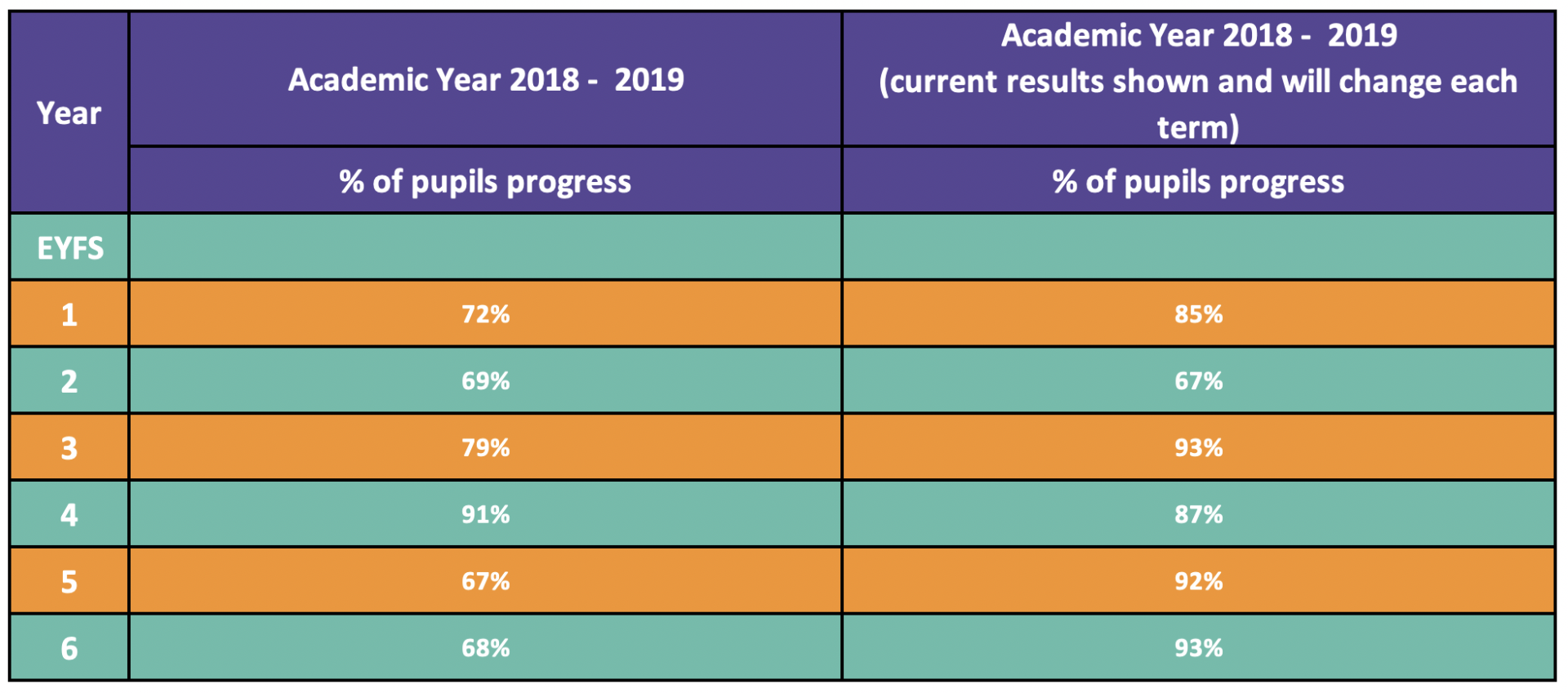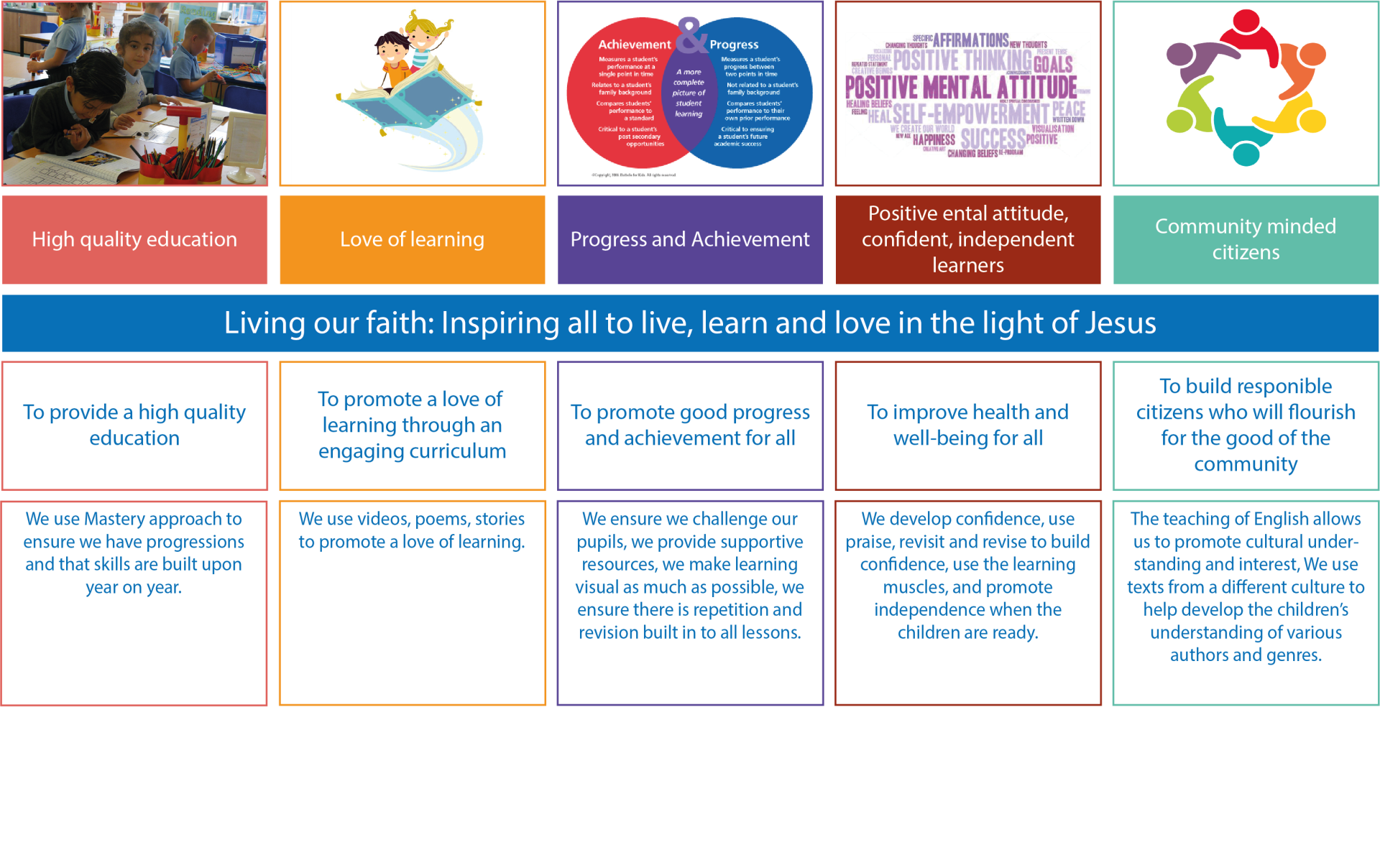St PaulinusCatholic Primary Academy
Inspiring all to live, learn and love in the light of Jesus
We are proud to work with all the Catholic schools across our two local authority areas, particularly as the Trust grows and benefits from the expertise and knowledge that other schools joining in the future will bring.
Visit UsA high-quality languages education should foster children’s curiosity and deepen their understanding of the world. The teaching should enable children to express their ideas and thoughts and to understand and respond to its speakers, both in speech and in writing. It should also provide opportunities for them to communicate for practical purposes, learn new ways of thinking and read great literature. English teaching provides the foundation for learning vocabulary and text structures, equipping children to write appropriately equipping them for later life.
At St Paulinus we follow the national Curriculum, which clearly identifies the aims English as:

At St Paulinus Primary Academy:
Children in key stage 1 and Early Years are exposed to different texts from a young age,
Children have daily lessons in English throughout their life at St Paulinus.
The programme of study for each year group builds upon previous knowledge year on year and through the academic year. It is organised in such a way that the children revisit and revise key feature of texts and reading skills as they go through the school allowing them to gain confidence.
It is intended that when children leave St Paulinus Primary, they will have an ability to write for different audiences, using different genres and be familiar with reading various texts. They should have developed a curiosity and build on the confidence to explore more challenging texts and be able to read for pleasure. They will be engaged and prepared to continue their learning at High School.
The curriculum is taught to all pupils and relevant and appropriate methods such as differentiation, shorter lessons or supportive resources is given to pupils who may need it, including those with Special Educational Needs.
Implementation – how we teach English
We endeavour to teach English (both Writing and Reading) in a fun and creative manner (which may not always be possible at all time). We aim to equip children with a wide vocabulary and an understanding of grammar (a cross curricular benefit) and we do this in a number of ways. Developing the ability to dissect the spoken and written word into its component parts is a valid and rewarding skill to learn at any age.
Reading and writing skills are reinforced by the development of Oracy, which gives a practical application to skills learnt. The practical element can be introduced into learning with the use of role play and the dramatisation of stories familiar to children.
English Mastery is a traditional study of the English Literary Canon. Children study the foundational texts of English Literature. The defining messages of these texts will support their future study of English and other subjects.
In order for children to be able to read and understand a text, they need to be experts in its domain. Having a strong understanding of the text’s context, plot, purpose and author enables them to make connections and solidify their understanding.
Creativity and originality emerge from a deep understanding of a subject’s foundations. By studying grammar and writing in isolation, children gain the foundational knowledge from which creativity can emerge. Being able to use subordinate clauses accurately enables children to compose multi-faceted narratives, articles and essays in English and in other subjects.
Children need explicit instruction in high-utility tier-2 vocabulary to make them better readers. Reading ability is strongly correlated with vocabulary knowledge. If children know more words, they will be able to understand and access more literary texts and more challenging texts across the curriculum, and be able to do more with them.
The structure of English lessons follows the following pattern:
Do now task (fun game or activity to practice already acquired knowledge or an introduction to a challenging new concept)
Introduce new learning (modelled learning by the teacher, new vocabulary, new text, new feature… could include a video etc)
Talk tasks – developing oracy (this could be partner talk, games)
Develop learning – applying oracy skills to written work or reading as appropriate or furthering oracy skill e.g. adding adjectives etc.
Independent task – children apply their learning in an activity (this can be recorded in many ways e.g. written, photos, matching activity, group activity)
Plenary – review of what we have learnt today.
Teaching focuses on key elements in order to support children in their progress – modelling (both orally and written) repetition in single lessons and across lessons (both orally and written), applying language in a range of situations, effective questioning, clear build-up of knowledge over time.
Children are formally assessed every half term using both formative and summative assessments as appropriate. The children’s writing skills improve progressively throughout the years which can be clearly seen in the children’s exercise books. Their writing is also moderated both internally and within the pyramid of school which means that judgements are shared with colleagues to ascertain the right judgement is given to the child.
Work in subject lessons is also supplemented by World Book Week / Day every year where children focus on a special activity linked to Reading and Writing and share their experiences with their peers.
At St Paulinus, we endeavour to see all children pick up a book and simply read for pleasure and we encourage this at every opportunity. We are extremely lucky that our children have access to a range of different books in our library and class book corners from Foundation Stage to Year 6.
In school we also have and celebrate:
Reading at home
It is an expectation at St Paulinus Primary Academy that learning is a shared responsibility between home and school, therefore all of our children and families are asked to read regularly at home. The expectation is the same from Foundation to Year 6.
In the Foundation Stage, the staff work with our families to demonstrate what ‘good reading’ looks like. The aim is that good habits, formed early on, will benefit the children as they progress through school.
It is vital that our children not only read but that they are read to. Children love listening to stories, no matter how old they are. Parents are encouraged to share books and talk about books to make it a special time to sit and read together. Reading is school is done regularly by adults and the most enjoyable moment is at the ends of the day when every class teacher reads the class chosen book. Listening to the change in tone, and different voices, can make these very exciting and appealing. It is also lovely and relaxing way to end the day.
You can see some of the impact of our curriculum in the work at the top of the page. Below you will find some data from last year and this year so you can see how our children are progressing in English. We also have some quotes from children when asked about their reading.

